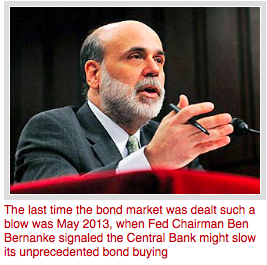
By this time next week, we’ll all know who the next president of the United States will be.
But it won’t matter one iota. The reason: We’re in the early stages of a sovereign debt crisis, a massive storm that hits the global economy roughly every 80 years and where the piper always gets paid.
Proof positive it’s starting: While central bankers have done virtually everything they could think of to prop up bond prices and depress interest rates to spark global economic growth …
A Great Bond Bust Is Starting to Unfold
Even negative interest rates in Europe haven’t done the trick of stoking its economy.
And now, just as I forecast last year, the bond bubble is starting to burst. Worldwide, bonds lost 2.9 percent from Oct. 1 to Oct. 27, a devastating blow in only 26 days.
The last time the bond market was dealt such a blow was May 2013, when then-Federal Reserve Chairman Ben S. Bernanke signaled the central bank might slow its unprecedented bond buying.
 Naturally, Europe led the losses as investors start doubting the viability that the ECB can continue to purchase debt, without boxing itself into a corner that will lead to bankruptcy, just like it will eventually for our own Federal Reserve.
Naturally, Europe led the losses as investors start doubting the viability that the ECB can continue to purchase debt, without boxing itself into a corner that will lead to bankruptcy, just like it will eventually for our own Federal Reserve.
The central banks (and governments) of Europe, Japan and the U.S. are all toast — it’s merely a matter of time before everyone realizes it.
There is simply no way …
— Europe, Japan and the U.S. will ever make good on the social promises and safety nets that they promised their people. And …
— No way each country’s central bank will survive. All three are between a rock and a hard place, with a total $12.7 trillion in debt among them that they will never be able to get rid of without crushing the global economy and sending interest rates to the moon.
Even if sold over a decade, they’d be selling more than $1.2 trillion worth of bonds each and every year. The market can’t handle it.
Welcome to the World’s Worst-Ever Sovereign Debt Crisis
Sounds trite. And I know what you’re thinking: “But Larry, we’ve been here before and nothing has ever happened. Governments can just kick the can down the road.”
My response: That’s true. In normal times, they can kick the can down the road.
But these are far from normal times. And it’s not even the level of debt that matters right now. It’s the revolution that’s in the air. You see, roughly every 80 years or so — the piper has to be paid.
It happened in the Great Depression (which led to WWII) … it happened roughly 80 years before that in the late 1860s … before that in the 1780’s … and pretty consistently every 80 years throughout Europe’s history.
There is no free lunch. Even for governments and central banks. The piper always gets paid.
So, What Does It Mean Directly for You and Your Investments?
First, you should steer clear of ALL government bonds and anything less than a AAA corporate or municipal bond.
Second, you should not mistakenly assume the U.S. stock market is going to crash along with bond markets. It’s not. All that frightened bond-market capital is going to seek shelter in the U.S. equity markets more than any in any other country.
Chief reasons:
A. As weak as our economy may get, and as lousy as our next leader may be, the rest of the world views our equity markets as the safest place to park big money. Period.
B. We have the biggest, deepest and most-liquid equity markets on the planet, and the only markets that can handle the trillions of dollars of money seeking shelter.
C. Dozens of U.S. companies are in better financial shape than most countries.
D. The U.S. equity markets are the last bastion of capitalism. Unlike Europe and Japan — not to mention many other parts of the world — Washington would never nationalize U.S. equity markets, or even a minor portion of them.
And lastly …
E. U.S. equities are becoming an alternative to bank deposits, where you earn nothing and you’re at risk of European-style “bail-ins” should your bank fail.
Given the above five reasons, I think it’s a no-brainer that my A.I. models and supercycles show the Dow Jones Industrials vaulting to over 31,000 over the next couple years.
Third, be ready to take advantage of huge new bull markets in key commodities and commodity companies in the natural-resource markets, especially in gold, silver and energy.
Lastly, if you think we haven’t been here before, go back just over 80 years to the middle of the Great Depression. Back then between 1932 and 1937 …
All of Europe went bust, Japan went bust, China was in trouble, and guess what happened?
Gold soared on the black market, along with the dollar — so much so that President Roosevelt had to devalue the dollar and then confiscate gold …
While foreign capital inflows into the U.S. equity markets also drove the Dow Industrials up 382% … even while the U.S. economy remained mired down in 25% unemployment and a depression.
History, as the saying goes, repeats itself. And that’s why the piper always gets paid.
Stay safe and best wishes,
Larry
P.S. Get your free copy of my new report “STOCK MARKET TSUNAMI” right away, click here to download now!












